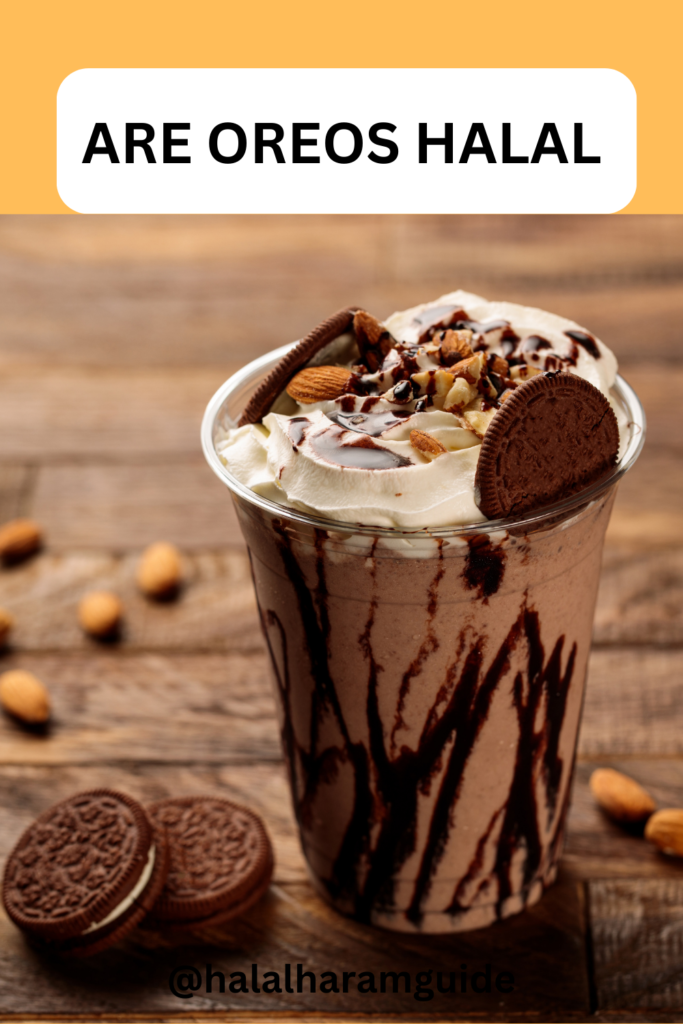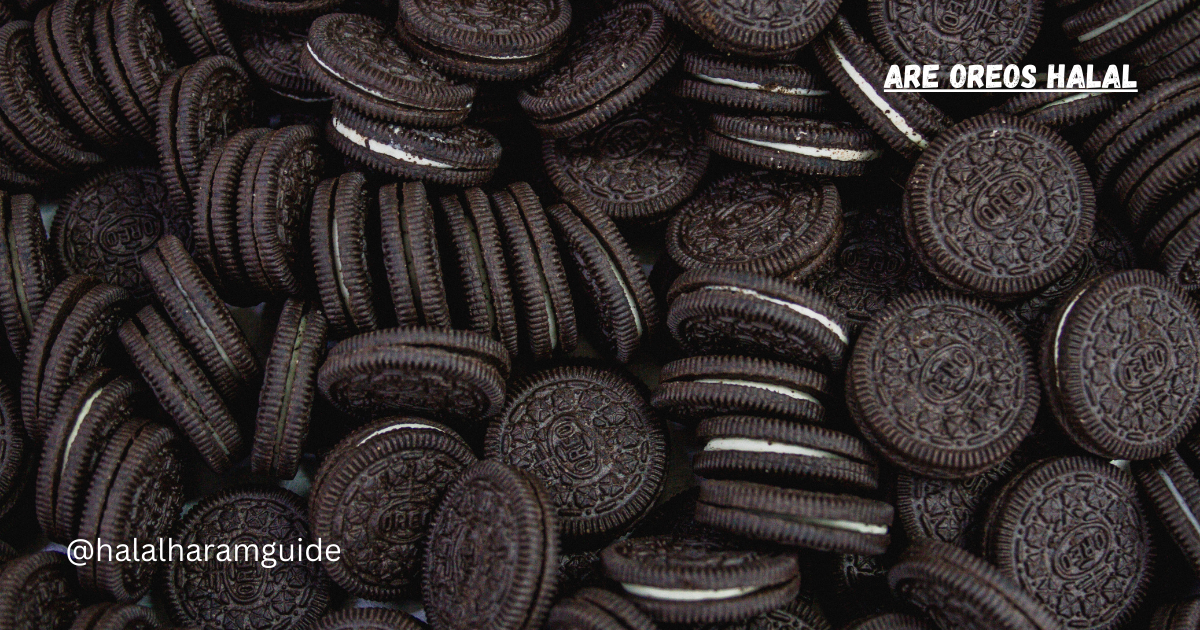Let’s talk about the topic “Are Oreos Halal?”
Oreos have become a beloved treat for people around the world, known for their delicious chocolatey cookies and creamy filling.
However, for those who follow halal dietary guidelines, the question of whether Oreos are halal is a significant one. Halal-conscious consumers often wonder about the ingredients used in these iconic cookies and whether they meet the requirements of Islamic dietary laws.
In this blog post, we will explore the halal status of Oreos, examining their ingredients and manufacturing processes to help you make an informed choice about whether these tasty snacks align with your dietary preferences and religious beliefs.
Let’s start,
What are Oreos?
Oreos are a popular brand of sandwich cookies. They consist of two round chocolate-flavoured cookies with a sweet, creamy filling in the centre. The cookies are known for their distinctive look, with a pattern of embossed designs on the outer surface of each chocolate cookie.
Oreos are often enjoyed as a snack or dessert and can be eaten on their own, dunked in milk, or used in various recipes, such as Oreo cheesecake or Oreo milkshakes. They come in various flavours and varieties, including Double Stuf Oreos (with extra filling), different flavoured fillings (like vanilla or mint), and limited-edition flavours that are periodically released.
Oreos have been a beloved treat since they were first introduced by the Nabisco division of Mondelez International in 1912 and have become a well-known and iconic cookie brand worldwide.
Are Oreos Halal in Islam?
The permissibility of consuming Oreos or any other food product in Islam depends on whether the ingredients used in the product are halal (permissible) or haram (forbidden) according to Islamic dietary laws. To determine whether Oreos are halal, it’s essential to check the ingredients listed on the packaging and verify that they meet Islamic dietary guidelines.
Generally, the primary concerns regarding the halal status of packaged foods like Oreos are:
Ingredients: Check the ingredient list for any haram ingredients, such as alcohol, pork, or non-halal animal-derived products. Some flavourings, emulsifiers, or additives may also be a concern.
Cross-Contamination: Ensure that the cookies are not produced on equipment or in facilities that process haram products, as cross-contamination can render the product non-halal.
Certification: Some Muslims prefer to look for products that have been certified as halal by a reputable Islamic organisation or authority. These certifications provide assurance that the product complies with Islamic dietary laws.
Ingredients in Oreos
the ingredients in classic Oreos typically include the following:
Oreo Cookie:
Sugar
Unbleached enriched flour (wheat flour, niacin, reduced iron, thiamine mononitrate {Vitamin B1}, riboflavin {Vitamin B2}, folic acid)
Palm and/or canola oil
Cocoa (processed with alkali)
Invert sugar
Leavening agents (baking soda and/or calcium phosphate)
Soy lecithin (an emulsifier)
Chocolate
Artificial flavour
Oreo Filling:
Sugar
Palm and/or canola oil
Soy lecithin (an emulsifier)
Artificial flavour
Oreos and Their Halal Status
Since the halal status of food products can change over time and may vary by region and manufacturer, it is crucial to:
Check the ingredient list on the specific package of Oreos you intend to purchase.
Research the manufacturing and production practices of the company that makes the Oreos.
Seek guidance from a trusted Islamic authority, scholar, or organization that can provide information on the halal status of specific brands or products in your region.
Please note that the halal status of Oreos or any other food product is a matter of personal choice and religious belief, and individuals should make informed decisions based on their own preferences and the guidance of their religious authorities.
It’s also a good practice to periodically check for updates on the halal status of food products as the information may change.
Alternatives for Halal-conscious Consumers
For halal-conscious consumers who are looking for alternatives to products like Oreos or other snacks, there are several options available in the market. Here are some alternatives to consider:
Halal-Certified Snacks: Look for snacks that have received halal certification from reputable Islamic organizations or authorities. These products have been officially verified as meeting Islamic dietary standards.
Homemade Treats: Consider making your own snacks and treats at home, where you have full control over the ingredients used. There are numerous recipes available online for homemade cookies, brownies, and other baked goods.
Other Brands: Explore other brands that offer halal-certified or halal-friendly snacks. Many companies produce cookies, biscuits, and confectionery items that cater to halal-conscious consumers.
Fruit and Nut Snacks: Opt for natural and unprocessed snacks like fresh fruits, dried fruits, and nuts. These are typically halal and provide a healthier alternative to packaged cookies.
Rice Cakes: Rice cakes are a popular and healthy alternative to cookies and can be flavored with various toppings like peanut butter, honey, or fruit spreads.
Halal Chocolate: If you’re specifically looking for halal chocolate treats, there are brands that produce halal-certified chocolates. Check the packaging for halal certification or ingredient information.
Halal Marshmallows: Marshmallows can be used in various dessert recipes. Look for brands that offer halal-certified marshmallows if you enjoy making halal-friendly desserts.
Health Food Stores: Health food stores often carry a wide range of snacks and treats that may align with halal dietary requirements. These stores can be a good source for unique and healthier snack options.
Imported Products: Some international brands may offer halal-certified or halal-friendly snacks. Check specialty or international grocery stores for such products.
Read Labels Carefully: Regardless of the brand or type of snack you choose, always read the ingredient labels carefully to ensure that they meet your halal requirements and do not contain any haram ingredients.
Share real-life experiences or testimonials from Muslim consumers regarding Oreos and their halal choices
I do not have access to specific real-life experiences or testimonials from Muslim consumers regarding Oreos or other specific products because my training data does not include such personal anecdotes or testimonials. People’s opinions and choices regarding halal products can vary based on their individual beliefs, preferences, and experiences.
However, you can find testimonials and discussions related to halal food choices, including Oreos, on various online forums, social media platforms, and consumer review websites. These platforms often include conversations and experiences shared by individuals who are halal-conscious and provide insights into their choices and recommendations.
If you’re interested in learning more about the experiences of Muslim consumers with specific products like Oreos, I suggest visiting online communities and forums where these discussions take place, or you can ask individuals in your local Muslim community for their opinions and experiences regarding halal food choices.
Conclusion
The halal status of Oreos, like many food products, can vary depending on the specific ingredients and manufacturing process.
To determine if Oreos are halal, it’s essential to check the product’s ingredient list and look for halal certification from a reputable Islamic authority.
Additionally, consumers should remain vigilant for any changes in product formulations or manufacturing practices that may affect the halal status of Oreos.
FAQ’s
Is Oreo Halal?
Whether Oreos are considered halal can depend on the specific ingredients used and the manufacturing process. Some Oreos may contain ingredients that are not considered halal, such as alcohol-based flavourings or certain emulsifiers. To determine the halal status of Oreos, it’s advisable to check the ingredient list and look for halal certification from a reputable Islamic authority.
Does Oreo Contain Soya (Soy)?
Yes, Oreos typically contain soy lecithin, which is a common emulsifier used in many processed foods, including cookies. Soy lecithin is derived from soybeans.
Does Oreo Contain Kosher?
Many varieties of Oreos are certified kosher. You can look for a kosher certification symbol (such as a “K” or “OU”) on the packaging to confirm the kosher status of a specific Oreo product. The kosher certification indicates that the product meets Jewish dietary requirements.
Do Oreo Cookies Contain Palm Oil?
Yes, Oreos often contain palm and/or canola oil, which are commonly used in cookie production. Palm oil is frequently used in processed foods for its texture and stability properties.
Are Oreo Cookies Nut-Free?
Oreos are typically considered nut-free. However, it’s crucial to be aware of potential cross-contamination risks, especially if you have severe nut allergies. Always check the packaging for allergen warnings and contact the manufacturer if you have specific concerns.
Are Oreo Cookies Suitable for Vegans?
Some varieties of Oreos are suitable for vegans. The classic Oreo cookies are usually made without any dairy ingredients, and the filling is often a non-dairy, vegan-friendly cream. However, always check the ingredient list, as limited-edition or specialty flavors may contain dairy or other non-vegan ingredients. Additionally, consider the manufacturing process and potential cross-contamination with dairy products if you have strict vegan dietary preferences.


